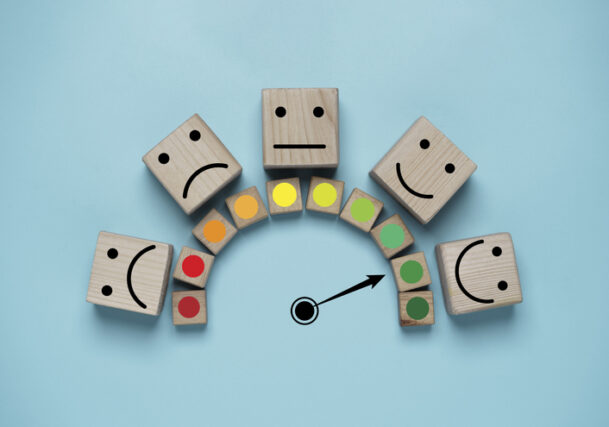Feelings can be confusing, overwhelming, and sometimes downright inconvenient.

Of course, they’re also your brain’s way of sending you important messages about what’s going on inside and around you. Instead of brushing them aside, listening to your emotions can lead to greater self-awareness and better decision-making. Here are 15 common emotions and what they might be trying to tell you.
1. Anxiety: You need clarity or preparation.

That jittery feeling in your stomach often pops up when something feels uncertain or out of your control. Anxiety might be your mind’s way of saying, “Let’s prepare for this, so we feel ready.” Taking a moment to plan or organise can often calm those nerves and give you a sense of direction. It’s a signal that you care deeply about what’s coming next.
2. Joy: You’re aligned with what matters.

When joy bubbles up, it’s a clear sign you’re doing something that resonates with your values or brings fulfilment. Whether it’s spending time with loved ones, hitting a goal, or simply enjoying a sunny day, joy reminds you to savour these moments. It’s a cue to look for more of what makes you feel alive and connected.
3. Sadness: You’ve lost something important.

Sadness is often tied to loss—whether it’s a person, opportunity, or dream. It’s your emotional system encouraging you to grieve and process what’s happened, so you can eventually heal. Giving yourself permission to feel sadness can be an act of self-compassion that clears the way for growth.
4. Anger: Your boundaries might have been crossed.

Anger is like your emotional alarm system, alerting you to something that feels unjust or harmful. It’s often a signal to evaluate whether your boundaries have been respected—or need to be reset. Channelling anger into action, like speaking up or addressing an issue, can lead to positive change.
5. Guilt: You might need to make amends.

That nagging guilt often arises when you’ve acted in a way that doesn’t align with your values or hurt someone else. It’s your inner moral compass nudging you to reflect and, if needed, make things right. Guilt can be a motivator to learn, grow, and strive for better choices in the future.
6. Fear: Something feels risky or uncertain.

Fear is your brain’s way of keeping you safe by highlighting potential dangers—whether they’re real or imagined. It’s often a cue to pause, assess the situation, and decide how to proceed. When approached mindfully, fear can help you weigh risks and make thoughtful decisions.
7. Excitement: You’re stepping into something new.

Excitement is like a close cousin to anxiety, but with a more positive twist. It often shows up when you’re on the brink of something novel or challenging. Your brain might be telling you, “This is an opportunity!” Leaning into excitement can help you embrace growth and possibilities.
8. Shame: You feel disconnected from your values.

Shame is one of the trickiest emotions, often tied to feeling judged or unworthy. While it’s uncomfortable, it’s your inner voice asking you to reflect on what’s important and whether you’re living in alignment with your beliefs. Acknowledging shame without letting it define you can be a powerful step toward healing.
9. Curiosity: You’re ready to explore.

When curiosity strikes, it’s your brain’s way of saying, “Let’s learn something new!” It’s an invitation to dive into experiences, ideas, or challenges that expand your perspective. Paying attention to curiosity can lead to unexpected opportunities and personal growth.
10. Envy: You want something someone else has.

While envy isn’t fun, it’s often a clue about what you value or desire. Instead of letting it fester, envy can guide you toward setting goals or working toward aspirations that matter to you. It’s less about comparing and more about identifying what inspires you.
11. Contentment: You’re in the right place.

Contentment is that warm, grounded feeling that arises when everything feels just right. It’s your emotional system telling you to appreciate the present moment and take stock of what’s going well. Recognising contentment reminds you to pause and enjoy the simple joys in life.
12. Frustration: Something needs to change.

Frustration often builds when there’s a roadblock or something isn’t working as it should. It’s your brain’s way of highlighting that something needs adjusting—whether it’s a plan, a habit, or a situation. Tuning into frustration can help you problem-solve and move forward.
13. Pride: You’re recognising your achievements.

Pride often comes from accomplishing something meaningful or making progress toward your goals. It’s your mind’s way of saying, “You did it!” Embracing pride without feeling guilty can help you celebrate your wins and build confidence for future challenges.
14. Loneliness: You’re craving connection.

Loneliness is your emotional signal that it’s time to reach out and connect with other people. Whether it’s calling a friend, joining a group, or spending quality time with loved ones, listening to this feeling can bring more balance and fulfilment to your relationships.
15. Love: You’re deeply connected.

Love shows up in many forms, whether it’s for a partner, a pet, or even a favourite hobby. It’s your emotions telling you that something—or someone—brings value and meaning to your life. Nurturing love deepens connections and strengthens bonds, creating a sense of belonging.




